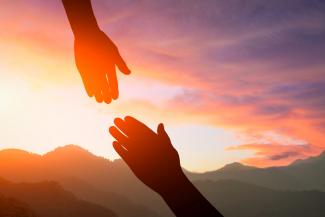
Do the preparation task first. Then read the article and do the exercises.
Preparation
'No one is winning these wars. We are all losing.'
UN Secretary-General, António Guterres
At the United Nations, 19 August is a day to reflect. It was on this day in 2003 that the UN building in Baghdad was hit by an enormous terrorist bomb. Most of the 22 people who died in the attack had been involved in humanitarian missions in Iraq. Among the dead was Sergio Vieira de Mello, the UN's top representative in the country. Every year, the UN commemorates the loss by observing World Humanitarian Day.
What is the objective of World Humanitarian Day?
This is a day to remember the brave humanitarian workers whose daily work can involve terrible dangers and even a risk to their lives. However, it is also a day to build public support for the people at the centre of this humanitarian work: the many millions of civilians around the world whose lives have been affected by conflict. Therefore, 19 August is a day to ask world leaders to commit to protecting vulnerable civilians and to do more to end conflicts in the world.
Where do these conflicts exist?
The UN has recently reported that, at the time of writing, the world's worst humanitarian crisis is in Yemen. Due to war and a shortage of food, it is said that up to 75 per cent of the population (that's about 22 million people) are in need of humanitarian aid and protection. Meanwhile, wars continue in Syria and South Sudan and these are just a few of the countries where conflict is forcing people to live in extreme difficulty or to become refugees.
What risks do humanitarian workers face?
Humanitarian workers must often risk their own lives to provide civilians with food, shelter or healthcare. Sometimes these workers are attacked by people who want to steal food or medicine. Many conflict zones also have big problems with political or terrorist groups who see humanitarian workers as an ideal target to get international attention.
What is #notatarget?
In recent years, the UN has promoted this online hashtag. Its message is very clear. Humanitarian workers have just one mission: to help people in need. And they should be able to do this in safe conditions. They should not be a target. At the same time, these workers travel to very dangerous places to provide aid for innocent civilians who have not chosen to live in conflict. The hashtag also implies that civilians should not be a target.
What can I do?
It may seem as if the problems of the world are impossible to fix, but there are a few things that you can do to help in some way. As a first step, inform yourself about the major humanitarian problems that the world is facing at the moment. With a quick online search, you will probably also find online petitions asking global leaders to increase their help for civilians in conflict zones and for the refugees that come from these situations. Or if you would prefer to help in a more practical way, try following the advice from previous campaigns for World Humanitarian Day: do something good, somewhere, for someone else.
Discussion
Language level
Topics
- Log in or register to post comments
- Log in or register to post comments
- Log in or register to post comments
- Log in or register to post comments
- Log in or register to post comments



